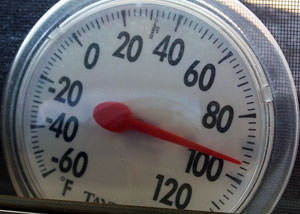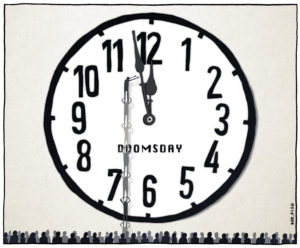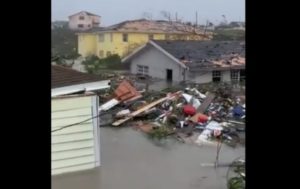Feeling the Heat
Still don't believe in climate change? Then you're either deep in denial or delirious from the heat.
Still don’t believe in climate change? Then you’re either deep in denial or delirious from the heat.
As I write this, the nation’s capital and its suburbs are in post-apocalypse mode. About one-fourth of all households have no electricity, the legacy of an unprecedented assault by violent thunderstorms Friday night. Things are improving: At the height of the power outage, nearly half the region was dark.
The line of storms, which killed at least 17 people as it raced from the Midwest to the sea, culminated a punishing day when the official temperature here reached 104 degrees, a record for June. Hurricane-force winds of up to 80 miles per hour wreaked havoc with the lush tree canopy that is perhaps Washington’s most glorious amenity. One of my neighbors was lucky when a huge branch, headed for his roof, got snagged by a power line. Another neighbor lost a tree that fell into another tree that smashed an adjacent house, demolishing the second floor.
Yes, it’s always hot here in the summer — but not this hot. Yes, we always have thunderstorms — but never like these. The cliché is true: It did sound like a freight train.
According to scientists, climate change means not only that we will see higher temperatures but that there will be more extreme weather events like the one we just experienced. Welcome to the rest of our lives.
This is the point in the column where I’m obliged to insert the disclaimer that no one event — no heat wave, no hurricane, no outbreak of tornadoes or freakish storms — can be definitively blamed on climate change. Any one data point can be an anomaly; any cluster of data points can be mere noise.
The problem for those who dismiss climate change as a figment of scientists’ imagination, or even as a crypto-socialist one-worldish plot to take away our God-given SUVs, is that the data are beginning to add up.
The National Oceanic and Atmospheric Administration says the past winter was the fourth-warmest on record in the United States. To top that, spring — which meteorologists define as the months of March, April and May — was the warmest since record-keeping began in 1895. If you don’t believe me or the scientists, ask a farmer whose planting seasons have gone awry.
NASA’s Goddard Institute for Space Studies, which monitors global surface temperatures, reports that nine of the warmest 10 years on record have occurred since 2000. The warmest year of all was 2010; last year was only the ninth warmest, but global temperatures were still almost a full degree warmer than they were during the middle of the 20th century.
Why might this be happening? Well, the level of heat-trapping carbon dioxide in the atmosphere is more than 35 percent greater than in 1880, NASA scientists report, with most of the increase coming since 1960. And why might carbon dioxide levels be rising? Because since the Industrial Revolution, humankind has been burning fossil fuels — and spewing carbon dioxide into the atmosphere — at what could turn out to be a catastrophic rate.
Scientists’ predictions about how quickly temperatures would rise — and how rapidly assorted phenomena, such as melting polar ice and rising sea levels, would proceed — have turned out, thus far, to be conservative.
There comes a point where anomalies can start looking like a trend. What much of the country has seen the past few days is no ordinary heat wave. Temperatures reached 105 in Raleigh, 106 in Atlanta and 108 in Columbia, S.C., and Macon, Ga., 109 in Nashville — all-time highs.
Meanwhile, the most destructive wildfires in Colorado history were destroying hundreds of homes — a legacy of drought that left forests as dry as tinder. Changes in rainfall and snowfall patterns in the West cannot, of course, be blamed on climate change with any certainty. But they are consistent with scientists’ predictions.
It becomes harder to ignore those predictions when a toppled tree is blocking your driveway and the power is out.
One other observation: As repair crews struggle to get the lights back on, it happens to be another sunny day. Critics have blasted the Obama administration’s unfruitful investment in solar energy. But if government-funded research managed to lower the price of solar panels to the point where it became economical to install them on residential roofs, all you global warming skeptics would have air conditioning right now. I’m just sayin’.
Eugene Robinson’s e-mail address is eugenerobinson(at)washpost.com.
© 2012, Washington Post Writers Group
Your support matters…Independent journalism is under threat and overshadowed by heavily funded mainstream media.
You can help level the playing field. Become a member.
Your tax-deductible contribution keeps us digging beneath the headlines to give you thought-provoking, investigative reporting and analysis that unearths what's really happening- without compromise.
Give today to support our courageous, independent journalists.






You need to be a supporter to comment.
There are currently no responses to this article.
Be the first to respond.